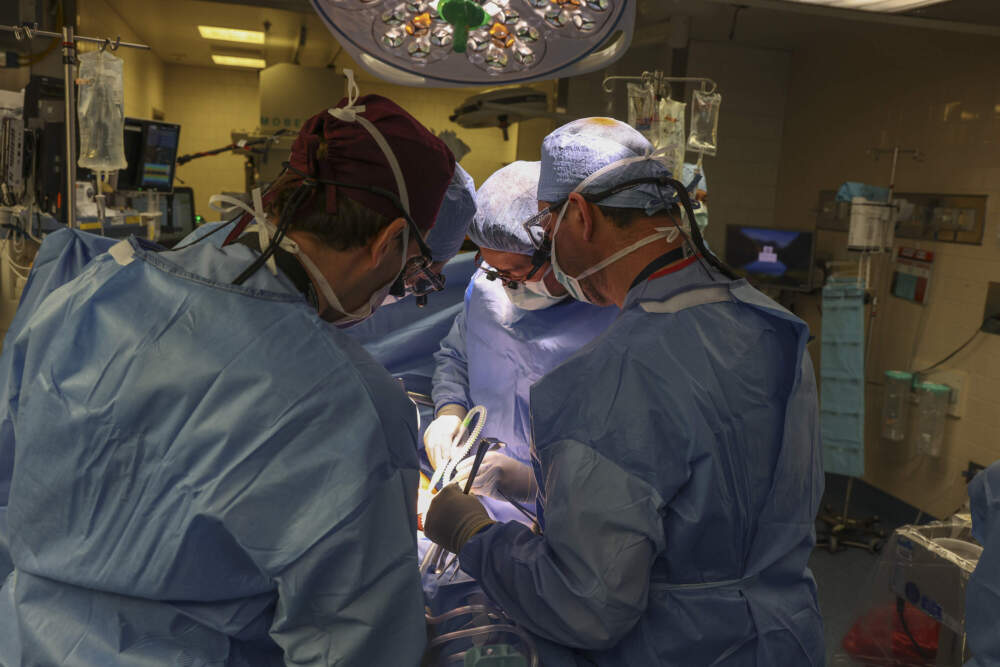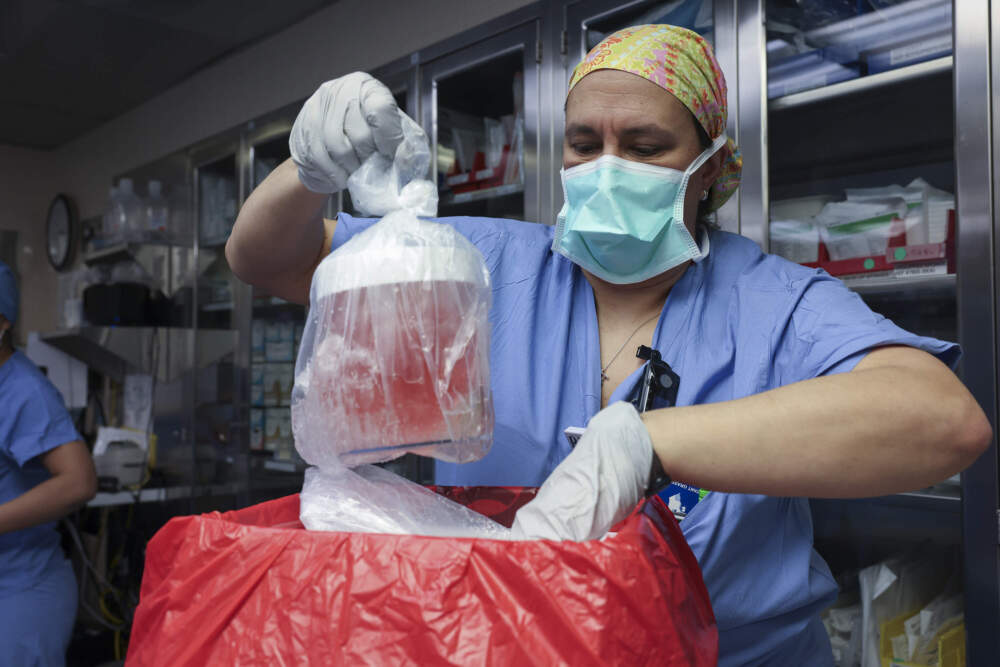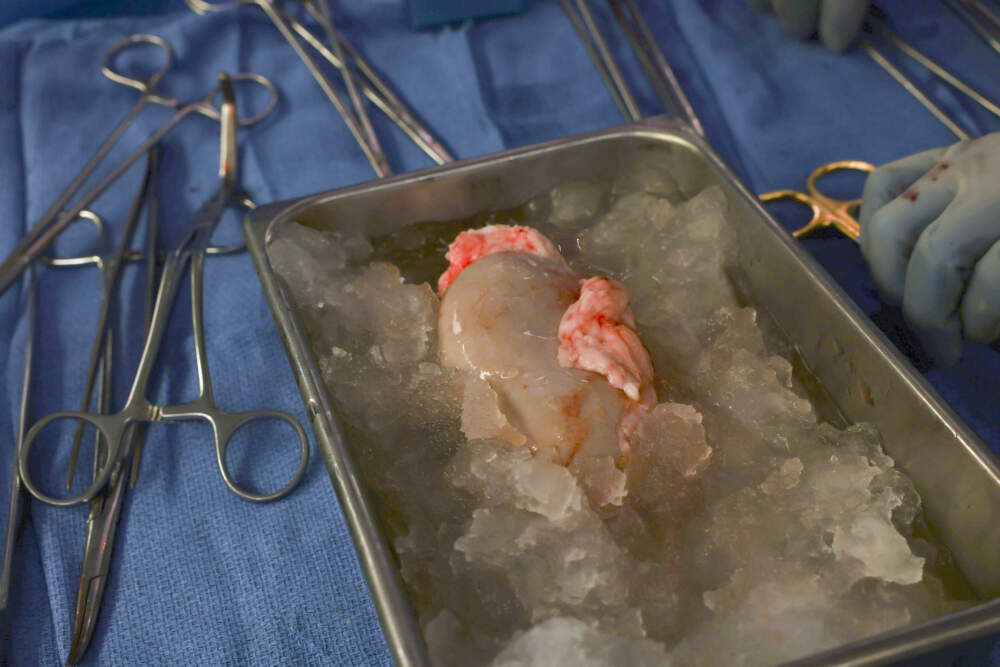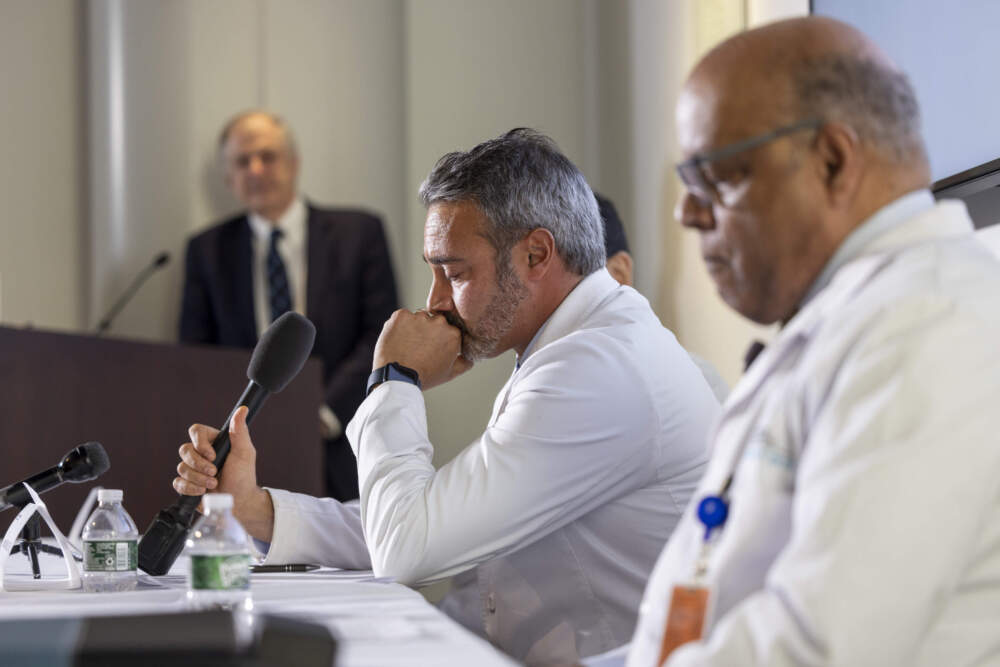Advertisement
In a first, doctors at Mass General transplanted a pig kidney into a living patient
Resume
Doctors at Massachusetts General Hospital on Thursday said they have transplanted a genetically modified pig kidney into a human living with kidney disease, the first such procedure in the world.
The patient, 62-year-old Richard Slayman of Weymouth, is recovering well and will be discharged from the hospital soon, according to his doctors.
The surgery is a milestone in the field known as xenotransplantation — when an organ from one species is transplanted into another — and is seen as a potential solution to the worldwide shortage of human organs for patients who need transplants.
Nationally, more than 100,000 people are on a waitlist for an organ transplant, and only some of the patients who could benefit from new kidneys actually receive them. Others endure long-term dialysis treatment. While on dialysis, patients may become too sick to qualify for transplants.
“Picture a different narrative,” said Dr. Leonardo Riella, Mass General’s medical director of kidney transplantation, “one where healthy young kidneys are readily available for transplantation in individuals with advanced kidney disease. Today, we are offering a glimmer of hope to many of these patients.”

- A member of the surgical team holds the pig kidney during the groundbreaking operation. (Courtesy Massachusetts General Hospital)
What seemed like science fiction just a few years ago could someday become a routine treatment option for people whose kidneys have stopped functioning.
Speaking to reporters Thursday, Riella became emotional describing the years of work that led to the complex four-hour operation on March 16.
This latest advance builds on decades of research. The world’s first-ever kidney transplant was performed 70 years ago at Brigham and Women’s Hospital, Mass General’s sister institution.
Research into pig organs has been hurtling forward in recent years. Surgeons at NYU Langone last year transplanted a pig kidney into a human who had been declared brain-dead to study the viability of the procedure. Other medical teams have studied transplants of pig hearts and pig livers into humans.
'The most beautiful kidney'
Mass General worked with a Cambridge-based company called eGenesis, which raises Yucatan minipigs at farms in the Midwest. One of the pigs was brought to Massachusetts, where its kidney was removed and sent to the hospital by ambulance, in a box, encased in ice.
As soon as the pig kidney was transplanted, it started working. Everyone in the operating room burst into applause, said Dr. Tatsuo Kawai, a transplant surgeon.
“The kidney pinked up immediately and started to make urine,” Kawai said. “It was truly the most beautiful kidney I have ever seen.”
Kawai said he hopes the organ will function for at least two years, based on data from experiments with pig organs transplanted into monkeys.

- The genetically modified pig kidney during surgery. (Courtesy Massachusetts General Hospital)
Scientists used CRISPR gene editing technology to make 69 changes to the pig kidney, removing harmful pig genes, adding human genes and making other edits to prevent the transmission of pig viruses.
“It’s very similar to the human kidney,” Mike Curtis, chief executive of eGenesis, told WBUR. “All the organs are correctly sized for human recipients. The physiology is relatively compatible with humans — and we can edit them.”
The company is cloning pigs but plans eventually to have the pigs breed, Curtis said.
Some experts have reservations about using pigs this way.
"I think we need to be very, very careful," L. Syd M. Johnson, a bioethicist at SUNY Upstate Medical University in Syracuse, N.Y., told NPR. "I have a lot of concerns about a therapy that is very much unproven."
Black patients disproportionately face kidney failure
Slayman, the Massachusetts transplant patient, has been living with diabetes, hypertension and kidney disease for many years. He was on dialysis for seven years, then received a kidney transplant from a deceased human donor in 2018. But that organ eventually stopped working, and he returned to dialysis. However, the dialysis treatment was complicated by clotting in his blood vessels, said his nephrologist, Dr. Winfred Williams.
Slayman’s illness was becoming unbearable.
“At one point he told me he thought he would not be able to go on,” Williams recalled. “He literally said, ‘I just can't go on like this. I don't want to go on like this.’ ”
So, Williams said, he began to think about “extraordinary options” that could help.
Slayman is Black. As with many health conditions, Black people experience disproportionately high rates of kidney failure, due to barriers including inability to access care and systemic racism.
Williams said xenotransplants could help to address those disparities.
“It's a true milestone in the sense that it also could be a potential breakthrough in solving one of the more intractable problems in our field: unequal access for ethnic minority patients,” Williams said. “An abundant supply of organs resulting from this technological advance may go far to finally achieve health equity.”
Slayman, who works as a state transportation department manager, released a statement through Mass General saying he opted for the experimental surgery after doctors carefully explained the pros and cons.
“I saw it not only as a way to help me,” Slayman said, “but a way to provide hope for the thousands of people who need a transplant to survive.”

This article was originally published on March 21, 2024.
